By Ashley Avila
SEEDS Community Agriculture is an agricultural nonprofit, with a focus on migrant and indigenous communities in the Arizona-Sonora desert, specifically the border town of Nogales, Arizona located on traditional Tohono O’odham land. Through an intergenerational leadership practice, SEEDS works to preserve indigenous agricultural practices and traditions as a means to reconnect with community through agricultural traditions.
Nogales often experiences the departure of young adults in search of jobs and education given the lack of local opportunities. SEEDS is creating spaces by and for our community to come together and collaborate to heal soil, grow food, heal community and grow local leaders. Having grown up in Nogales, there are few opportunities to get involved in sustainability initiatives, despite its position as a major international food hub and international border with unique environmental issues. This past summer, I worked with SEEDS Community Agriculture on sustainability and agricultural initiatives with the support of the Center for Regional Food Studies.
Throughout the summer, my tasks involved leading volunteers and scheduling work days, while being present at all staff work days and open volunteer days. Occasionally, I worked on other tasks as needed such as promoting our work on social media, such as our Instagram, and making designs for our on-going SEEDS micro farm. Working at SEEDS Community Agriculture gave me the opportunity to learn and practice permaculture techniques. Throughout the Summer, SEEDS group collaborated with The Borderlands Program of Sierra Club and I was able to learn about permaculture design principles, adobe-working, wood-working, stone-working, fence building, and about food sovereignty and place-making. The Borderlands Program of the Sierra Club also hosted a movie screening in Downtown Nogales to bring attention to local environmental non-profits, which made it easy to connect with local community members about food justice. I especially enjoyed being able to practice firing up our adobe brick oven to make baked goods.
One of my favorite aspects of working with SEEDS was learning more about permaculture, which is a methodology inspired by nature and traditional knowledge. Permaculture design is a design approach that integrates human elements into a natural setting in a permanently sustainable way. Across the summer, with the guidance of The Borderlands program of Sierra Club, we drew out sector maps and garden plans to identify our water sources, shade sources, and sun sources. Once our map was complete (see below for the version I modified on Adobe Illustrator), we began implementing the design choices. We built up several stone-bunds in order to minimize soil erosion along several of our native Mesquite trees. We also set up our own water-cistern and rainwater harvesting system alongside an old house set-up nearby.
In addition to learning about permaculture techniques, I was able to learn about adobe-working, wood-working, stone-working, fence building, and about food sovereignty and place-making. I especially enjoyed being able to practice firing up our adobe brick oven to make baked goods.
Our food area, the site which we use to plant our season crops, required a lot of additional landscaping and shovel work. In previous years, the summer monsoons quickly eroded the food area and local animals had picked off parts of the remaining harvest. This year, we set up netting to prevent rodent access, added more detention basins and bunds, and changed the layout of our crops. By fall, we had a great harvest of O’Odham and Yaqui calabaza, as well as O’Odham Yellow meat Sandias (pictured below).
Author Biography
Ash Avila is a University of Arizona senior majoring in Sustainable Built Environments with a minor in Spanish. She was born and raised in Nogales, Arizona, where SEEDS Community Agriculture is located. Growing up in this small border town led to her interests in urban design, sustainable communities, and urban food systems in cities, especially cities with majority Latino populations. The CRFS award helped support her work in creating a local food hub in Nogales, Arizona with SEEDS Community Agriculture. Over the summer, she was able to help set up a rainwater harvesting system; plant squash, beans, and corn (las Tres Hermanas crops) and begin the planning process for an official opening date for our first educational farm. You can reach Ash via email at avila01@arizona.edu or ashleyavila01@gmail.com. You can learn more about SEEDS on their social media or visit them in person at Las Lagunas de Anza Wetlands W. Country Club Dr, Nogales, AZ 85621.
SEEDS Facebook: https://www.facebook.com/seedscommunityagriculture/
SEEDS Instagram: https://www.instagram.com/seeds_semillas_/
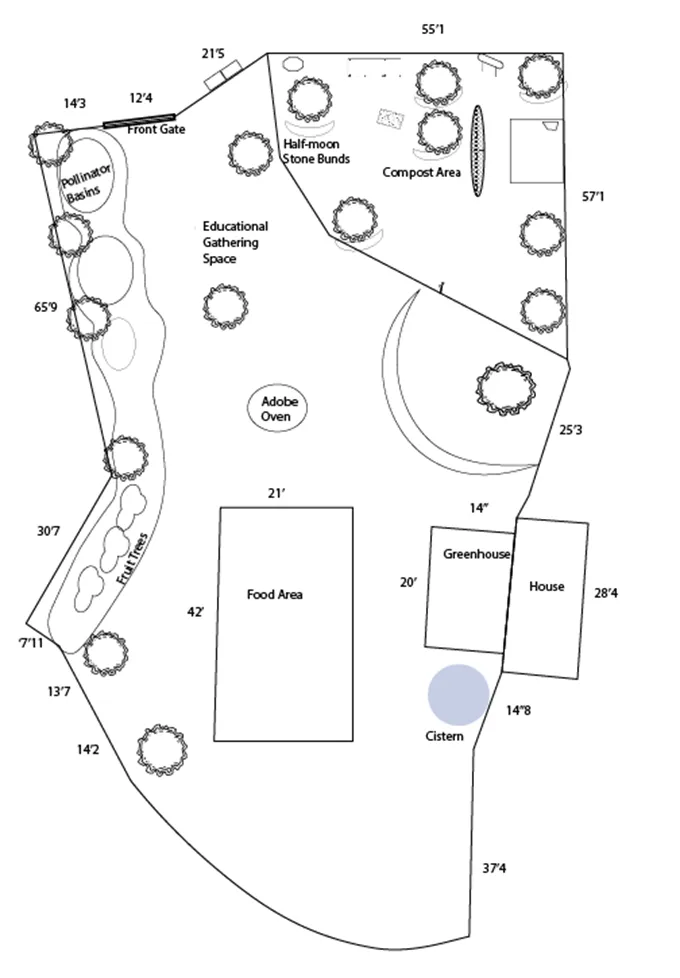
An overview sample map of the design for our overall garden’s compost area made with permaculture design principles in mind.
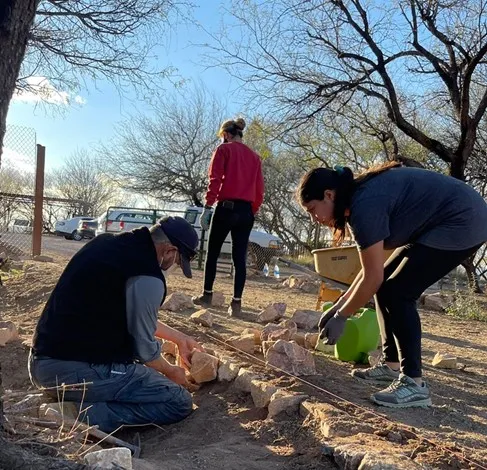
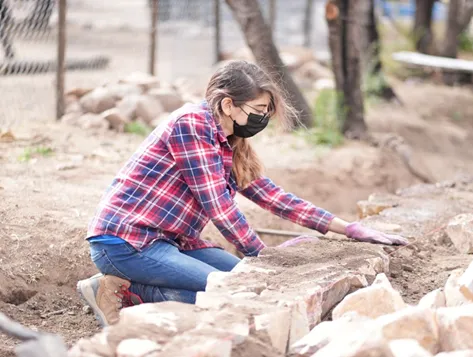
Working on stone edges alongside pollinator gardens and the food area to better manage rainwater
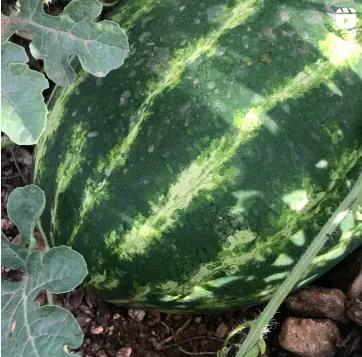
A picture of the O’odham yellow meat watermelons.
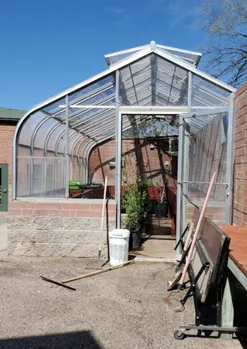
A picture of the Challenger Elementary School greenhouse from outside, where we collaborate on educational opportunities and plant seedlings and trees for our mini farm at Las Lagunas
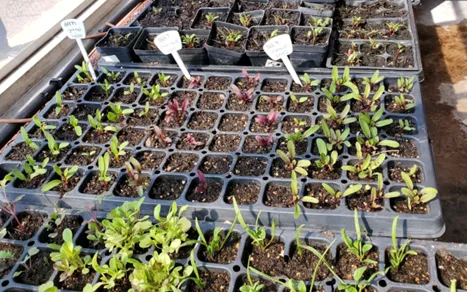
A picture of a few of our growing seedlings.
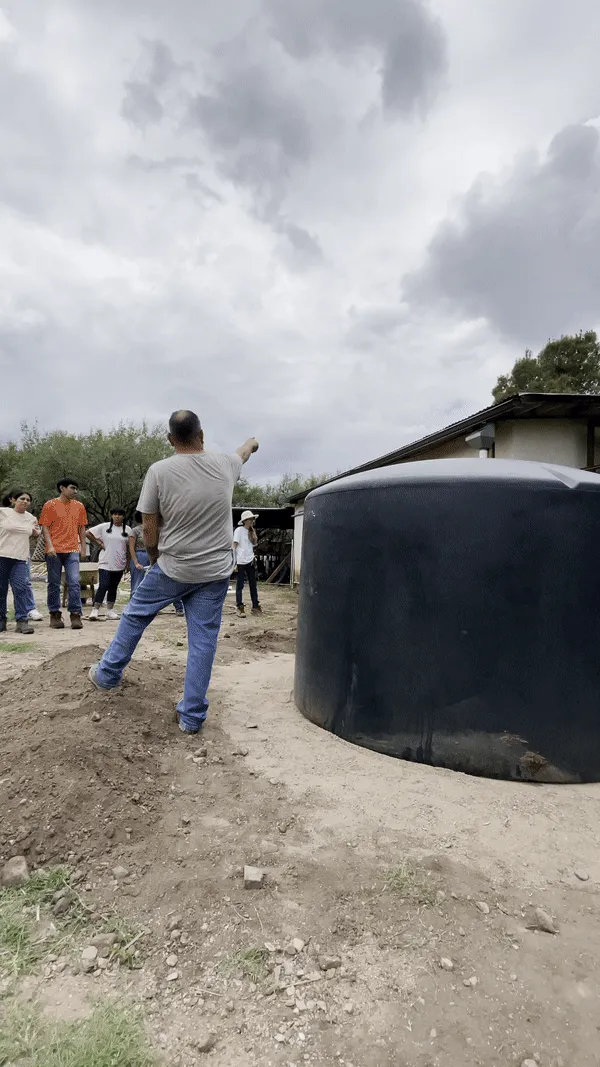
GIF of rainwater harvesting and cistern workshop that was held in July 2022.

